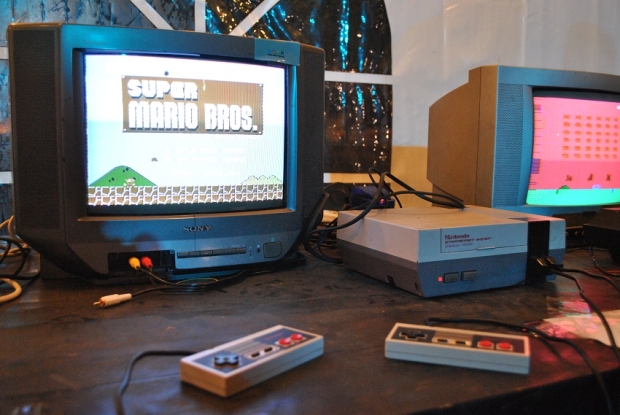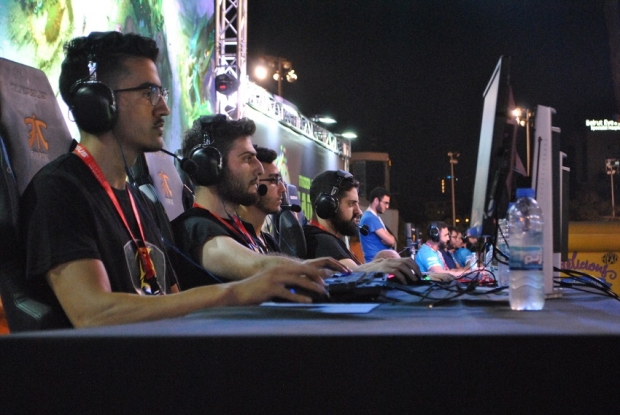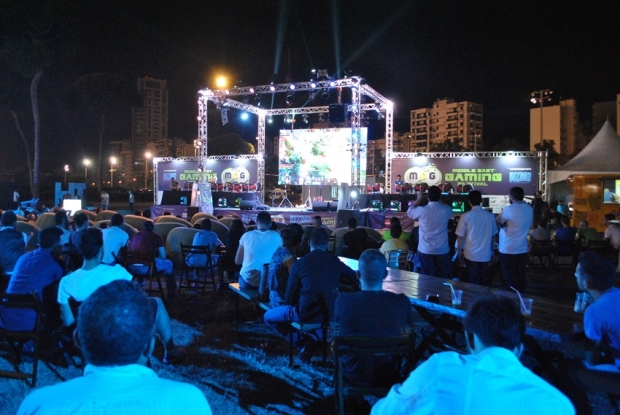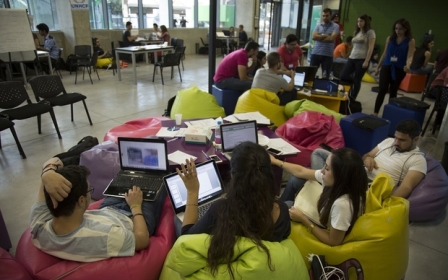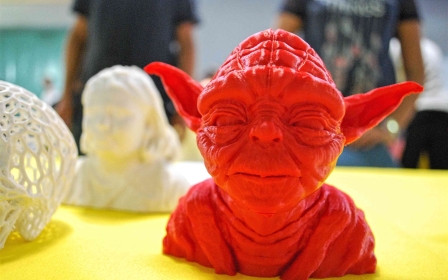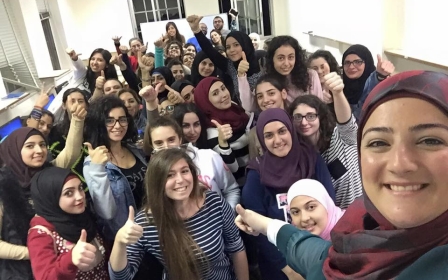'The rise of geekdom': Lebanon's gamers see lucrative future in growing sector
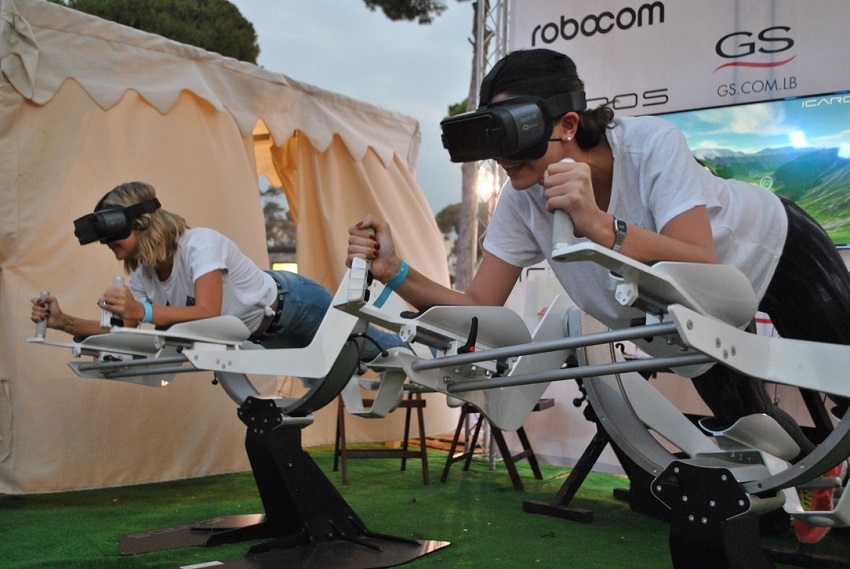
BEIRUT - Linardo Nohra was three years old when he first began playing Super Mario Bros with his older sister at their childhood home in Beirut.
By the age of 13, he was making his own video games. Today the 23-year-old is at the forefront of Lebanon’s budding gaming culture, after designing his own action role-playing game (RPG) and virtual reality space shooter.
His story of youthful interest turned industry leader echoes throughout the rising gaming community in Lebanon.
The Middle East Gaming Festival (MEG), held at the Beirut Hippodrome from 31 Aug – 3 Sep, aims to bring together and solidify the gains made by the gaming community in the region over the past few years.
Now in its second year, the festival is a natural development in Lebanese gaming culture, with many of the organisers and participants calling the country home.
“We are gathering all the gamers in one place,” Jhony Khawand, the organiser of MEG told Middle East Eye. “We want people to know that this sector does exist, and it will grow in the future.”
The open-air hippodrome offers a unique environment for gamers who, as Khawand points out, usually “gather and network in indoor spaces”.
Over 2,000 patrons attended the festival this year, trialling demos from local game developers and watching gamers compete in the Lebanese Gaming Championship.
Developing a community
Kevin Gbalay, a 23-year-old accomplished game developer, said that interest in his occupation has grown significantly. “When I was a kid the [gaming] community was two people, me and my friend.”
However, open-source engines, social media and downloadable games have allowed for people to connect, exchange ideas and publish their work independently.
Saed al-Dine Rajab, a game developer exhibiting a virtual reality classroom where players can learn about health through interacting with a cartoon human heart, downloaded the free Unreal Engine in 2015 at the age of 20. This software provided Rajab and those like him with a base to start creating their own games.
Rajab and Nohra were among the first to participate in this organic development of the gaming industry in Lebanon. Long-time friends, they graduated from the American University of Science and Technology (AUST) in computer science, but they have always prioritised gaming.
During their studies, they would meet up with others in the community, challenging each other to create new games.
The success of this informal group saw it expand from a dozen people to hundreds of participants, with developers from Sidon to Tripoli joining the community.
However, Lebanon is still in its gaming infancy and cannot compete with big companies in the US, China and Japan. Instead, small start-ups like Merry Berries, Falafel Games and Groovy Antoid have been established and they are slowly edging into the mainstream by producing low-cost mobile games.
Groovy Antoid’s most recent game, a 2D platformer called Fat Bunny: Endless Hopper, an addictive game where a large bunny bounces over rolling hills to eat carrots while avoiding obstacles, has already racked up over 100,000 downloads on Google Play.
At first the tournaments had a prize of about $200 - and now its 40 million Lebanese pounds ($25,000)
- Omar Merashli, professional gamer
These companies and other local developers are seeking to mimic the rise of gaming seen across the world. Looking to the US, Rajab said: “Video games are beating up Hollywood right now.”
It is a sentiment reflected by games such as Grand Theft Auto V, which has made over $6 billion worldwide. When compared to the $2.7 billion of Avatar, the highest grossing movie of all time, the numbers speak for themselves.
These sorts of numbers bring hope for the young developers who see themselves as paving the way for a massive entertainment industry to break into their home country.
But gaming is not just growing economically and culturally, the technology involved is also expanding.
A new reality
Bizarre and novel inventions are moving the scope of gaming away from traditional hand-held controllers.
Robocom, a Dubai-based company with an office in Beirut, has started to introduce virtual reality (VR) systems to the region.
The company showcased Icaros, one such example of VR, at MEG. The contraption, somewhere between a gyroscope and gym equipment, allows users to manipulate a skydiving virtual reality character with their own body.
Samir Rayess, a Lebanese national and partner at Robocom, described the system as more like a “fitness device than a game”.
Despite admitting to his Luddite tendencies, Rayess saw the potential of VR technology after seeing it in action at the US art festival, Burning Man, in 2015. He now envisions a world where VR is used for everything from conducting surgery to visiting the pyramids.
Despite Robocom selling widely in Asia, Rayess acknowledged that “it will take a while to catch on” in Lebanon. But he will be there when it does, saying that “[Lebanon] is our home…. [we will bring] what we did outside here.”
However, game designers and sellers only make up half of the industry. Players are also making their mark on the community in Lebanon.
From playtime to pay time
One of the most foreign aspects in gaming culture to those on the outside of this world is the idea that you can make a living off playing games - yet it is true as many do earn money through competitions and sponsorship. Professional gamers such as Pakistan's Sumail Hassan made over $1.5 million by the time he was 16 years old.
This has changed the perception of gaming from being a hobby to a legitimate career path.
To foster local talent, MEG also held the Lebanese Gaming Championship (LGC) - the first of its kind in the country. Players competed in a variety of games. These include titles such as the multiplayer online battle arena Dota 2, where teams of five select characters ranging from frost dragons to wizards lay siege to the opposing teams’ fortress.
However, it is a long and difficult road to become a top eSport earner. Instead, young gamers such as 18-year-old Omar Merashli are using their talents as a subsidiary source of income. Merashli is studying communications engineering in Beirut but he is also a competitor in LGC.
Merashli has been playing the online shooter Counter Strike Global Offensive since he was nine years old. In the online shooter teams compete over a variety of objects such as planting versus defusing a bomb, with one side playing the terrorists while the other plays the counter-terrorists. The winning team is determined by whichever side achieves their objectives and gets the most kills.
There are people who can make Lebanon famous, make the Lebanese flag seen throughout the world
- Omar Merashli, professional gamer
Merashli honed his skills at a gaming cafe down the street from his house in Zarif, a small suburb of Beirut.
“At first the tournaments had a prize of about $200,” Merashli told Middle East Eye, “and now its 40 million Lebanese pounds ($25,000),” he said in reference to the winnings at LGC.
Merashli hopes to make a living out of playing video games like his idol Maroun Merhej, a Lebanese professional gamer. Under his alias GH Gamer, Merhej went from playing at the same gaming cafes Merashli did to competing in global championships, travelling the world, and making nearly $2.5 million in winnings.
The dream of becoming a professional gamer is growing in Lebanon, fuelled by the expansion of gaming cafes that grew from around three in 2015 to over 200 today, according to Rayan Khalil, the owner of eSports Lounge, a Lebanese gaming cafe chain.
“Here in Lebanon we should keep on improving because we are getting results,” Merashli said. “There are people who can make Lebanon famous, make the Lebanese flag seen throughout the world.”
Whether it be developers flexing their artistic muscles in a new medium, entrepreneurs introducing cutting-edge technology, or gamers moving from their hometowns to the international stage, video games are growing in Lebanon.
“The rise of geekdom is substantially increasing here,” Nohra told the Middle East Eye.
This article is available in French on Middle East Eye French edition.
New MEE newsletter: Jerusalem Dispatch
Sign up to get the latest insights and analysis on Israel-Palestine, alongside Turkey Unpacked and other MEE newsletters
Middle East Eye delivers independent and unrivalled coverage and analysis of the Middle East, North Africa and beyond. To learn more about republishing this content and the associated fees, please fill out this form. More about MEE can be found here.



